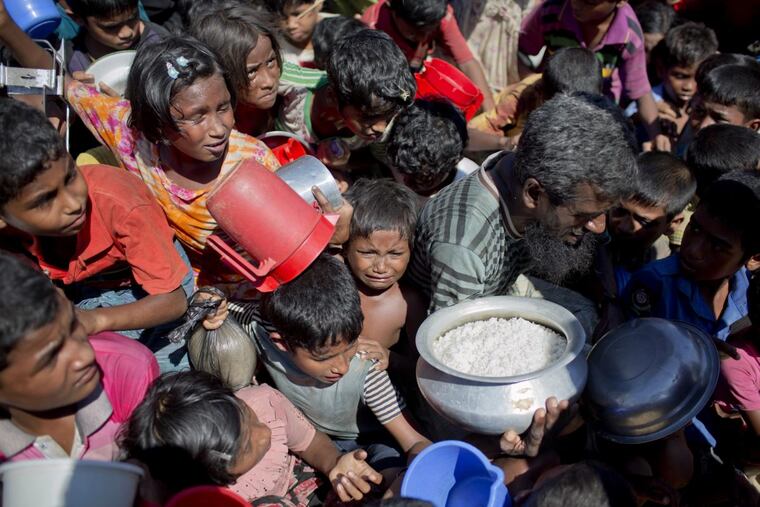Counting blessings at a time when far too many in need | Commentary
As human rights abuses like those taking place in Myanmar continue, we must own that our silence equals our stamp of approval.

As we gather with our families to give thanks, I invite you to peer into my medical clinic waiting room in Durham, N.C.:
The room is often filled with little Syrians, Somalis, Afghanis, Iraqis, and Burmese, boys and girls, who pack in next to families from Rwanda, Eritrea, Cuba, and Congo, all waiting for their coveted 15 minutes with the doctora, daktare, tabiba.
And, relatively speaking, these young refugees are among the luckier ones. I have walked into waiting rooms elsewhere in the world that are much more crowded than mine, holding the millions who still seek asylum despite an indefinite wait.
These other refugee clinics hold horrors that are more freshly — and usually more deeply — felt. Some in Bangladesh are stocked with wasted Rohingya children, with cholera and no parents. Some see long queues of Sudanese girls pregnant with their smuggler's baby. Many families in flight simply have no health care, like those remaining stranded on the remote Manu Island, or the thousands blocked at Yemen's borders, or the unlucky ones whose boats were intercepted and returned to Libya.
So numerous are these disasters that it seems easy to resign to amnesia or apathy. Looking and feeling requires courage, my patients tell me.
"Never again" and kwibuka ("remember" in Kinyarwandan) are slogans spread in the wake of the Rwandan genocide of the early 1990s. Yet it seems we have already forgotten what Rwanda tried to warn us of. Several months ago, a U.N. human-rights official described the Rohingya crisis in Myanmar as "a textbook example of ethnic cleansing."
Genocides cannot proceed without international cooperation or inaction — which signals indifference. As human rights abuses like those taking place in Myanmar continue, we must own that our silence equals our stamp of approval.
I sometimes wish I could forget Rwanda, and what I saw when I went there to rebuild a medical school still in shambles two decades after the genocide: families still so poor that babies were born too early and too small because mothers couldn't afford to eat. Children died from bloodstream infections, because the hospital couldn't afford enough sterile gauze or gloves. The transfusion center was always out of blood.
And if only I could erase the misery I found when I traveled to the outposts of Myanmar several years ago, when the country braced for its own imminent genocide. Even then, some children weren't allowed to attend school and instead worked as laborers or were sold to traffickers. Others died from simple pneumonia because it took too long to reach a clinic, and too long for us to reach them.
I do sometimes wish I could be more silent, as I ask my boss for a few weeks off to work in a Rohingya camp in Bangladesh with an NGO called Medical Teams International. I realize my waiting room will get backed up while I'm away, but when I tell my patients where I am going, they thank me.
I can say with some certainty that my patients, with their hodgepodge of histories and ethnicities, do not forget the atrocities taking place elsewhere — the wrongs we essentially enable. And they are keenly aware of the xenophobic rhetoric that now occupies their new home.
Yet, they also carry the brightness of possibility. Here, they see they actually have a chance at life — and they thrive. Their English skills proliferate, they boast about their "soca team" and their many new best friends, and all seem to want to be a daktare for kids when they grow up.
When I question myself about leaving my home, my husband, and my patients to dive back into the horrors of a humanitarian disaster, I cannot help but remember those other waiting rooms. I cannot help but act. How else do I give thanks for the abundance of resilience that fills my waiting room each day?
B. Emily Esmaili is a general pediatrician with extensive global health experience locally and internationally. She works at the Lincoln Community Health Center in Durham, N.C., and is a senior research fellow at Duke University's Center for Health Policy and Inequalities Research.